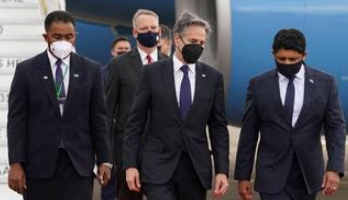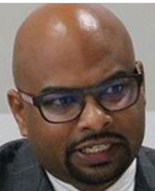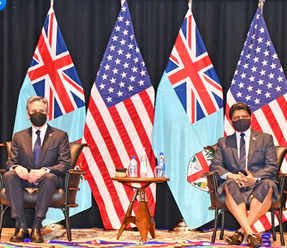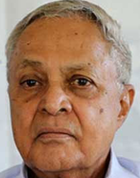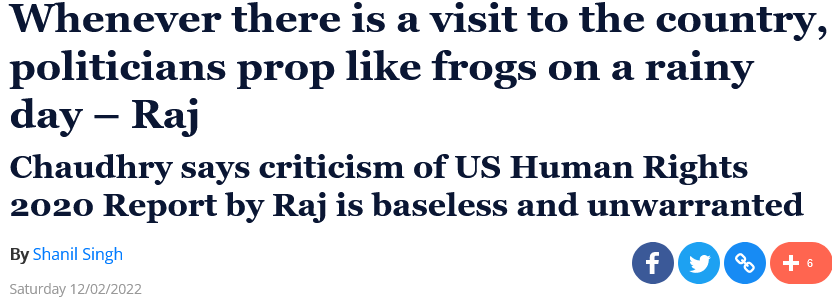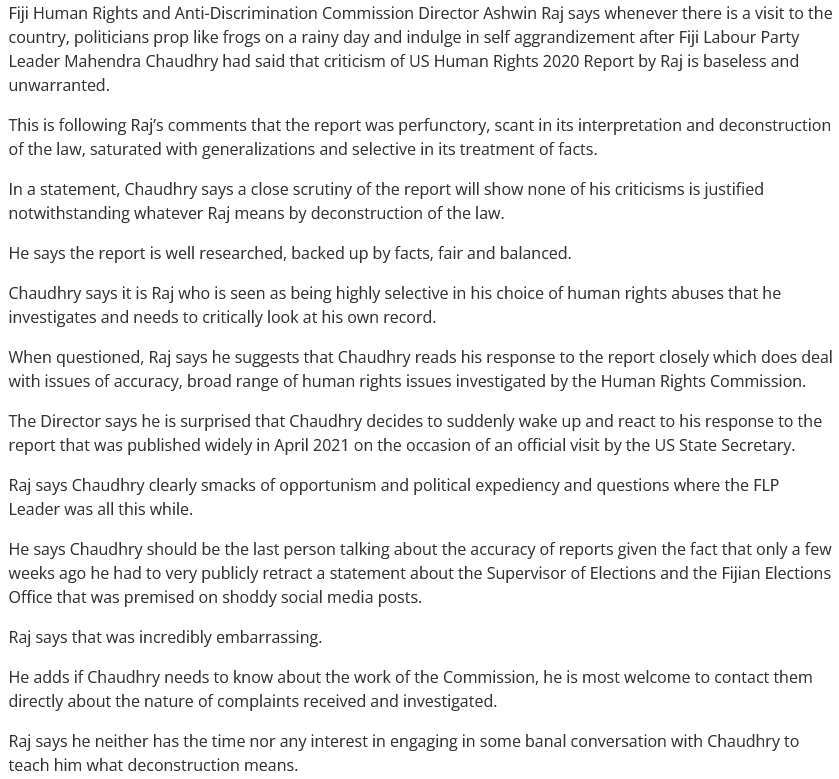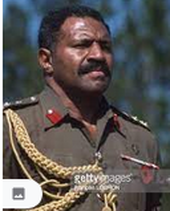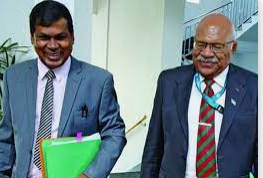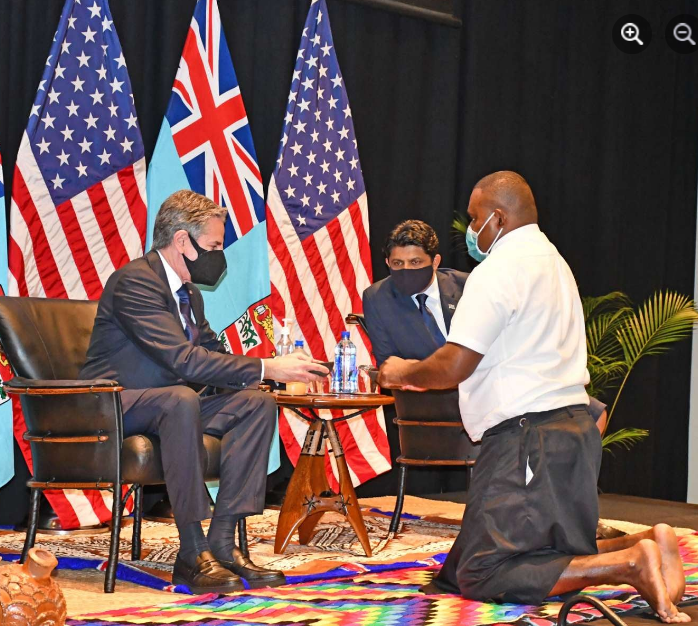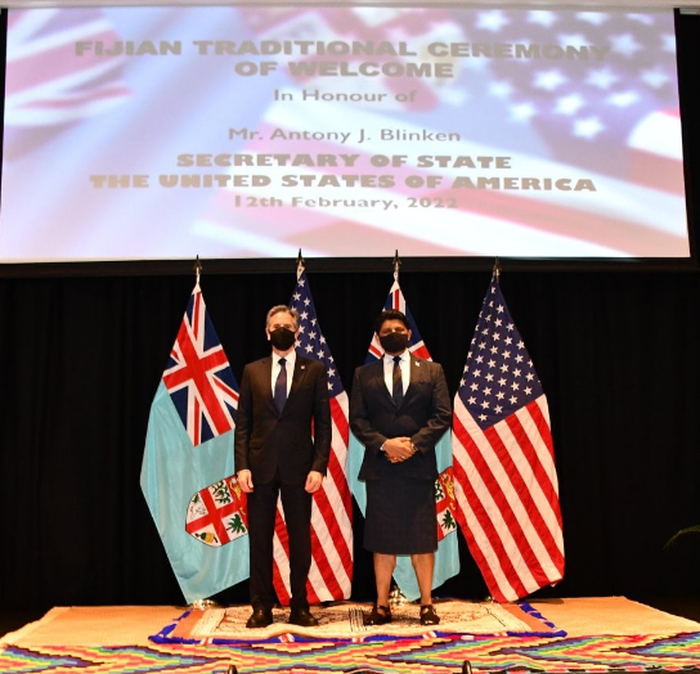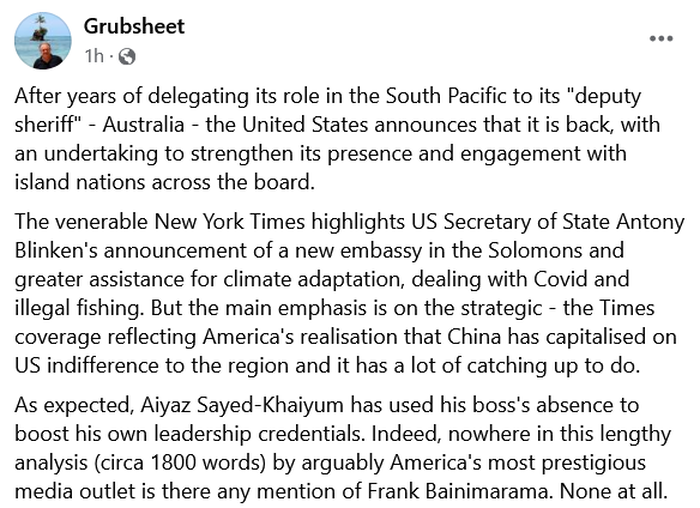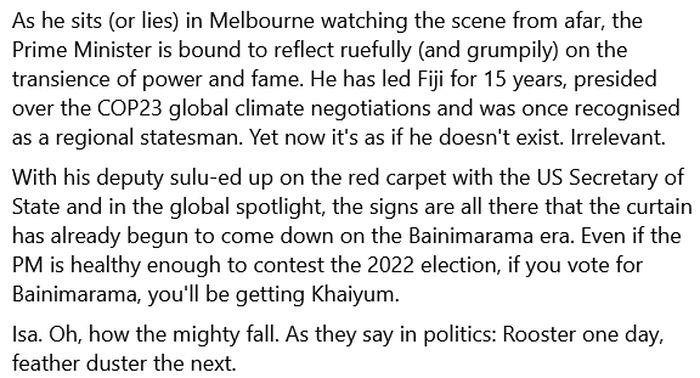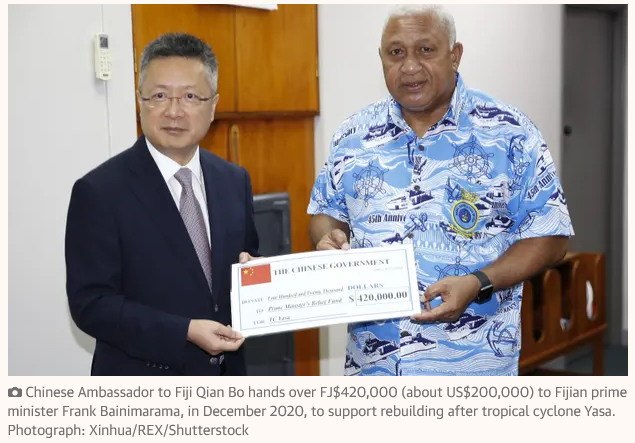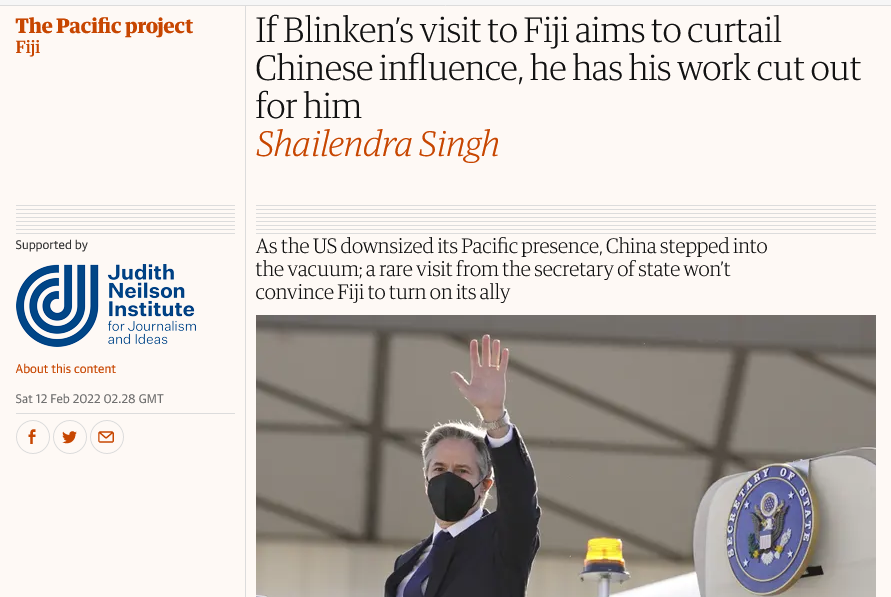ISA! The world famous Bainimarama IPAD saved for another RAINY DAY
AHWHIN Raj says he neither has the time nor any interest in engaging in some banal conversation with FLP leader MAHENDRA Chaudhry to
teach him what deconstruction of the law means.
DECONSTRUCTION: "Deconstruction is a form of criticism first used by French philosopher Jacques Derrida in the 1970s which asserts that there is not one single intrinsic meaning to be found in a work, but rather many, and often these can be conflicting. It is a method of critical analysis of philosophical and literary language which emphasizes the internal workings of language and conceptual systems, the relational quality of meaning, and the assumptions implicit in forms of expression."
Fijileaks: In Simple English:
'Deconstruction is a way of understanding how something was created.'
WORLDS COLLIDE: A son of Hungarian immigrant Jews and the descendant of Indian Indentured Labourers share global stage in Fiji. Blinken's stepfather, Samuel Pisar, was the only Holocaust survivor of the 900 children of his school in Poland. Pisar found refuge in a US tank after making a break into the forest during a Nazi death march. Like the 'Brown Jews of Fiji' in 1987 and 'No Other Way', Adolf Hitler wanted
to eradicate the Jews throughout Europe with his Final Solution
The US secretary of state’s lightning visit to Fiji may be sudden, but not surprising. That Antony Blinken is the first US secretary of state to visit Fiji in 37 years reflects just how much has changed geopolitically.It is also an indication of Fiji’s influential role in this part of the world, being a strong, if not the strongest, Pacific ally of China, the arch-rival of the US in the Pacific.
In what is an election year for Fiji, Blinken appeared keen to meet the Fijian prime minister Frank Bainimarama, who is known to be close to China, but he remains hospitalised in Australia, after a serious operation, so the acting prime minister Aiyaz-Sayed Khaiyum plays host.
Blinken’s team will use the visit to reassure Pacific Island leaders of the Biden administration’s commitment to regional concerns, chief of which is climate change, following America’s return to the Paris Agreement. Maritime security and illegal fishing will also be on the table, according to US officials, which means that China’s shadow looms large in the meeting.
Not for the first time, Blinken raised the spectre speaking this week to The Australian of China’s ambitions to become the “leading military, economic, diplomatic and political power, not just in the region, but in the world” and the need for a united front against Chinese expansionism. This is an old memo with a new sense of urgency, at least for the US and its allies, not the least because of the latest Russia-Ukraine conflict, which has seen China and Russia bonding ever more strongly over a common foe.
AdvertisementThe US clearly sees a need to draw its friends closer, even far-flung Pacific friends, but unlike the cold war, communist China is no longer seen as a threat in Fiji and the region. To the contrary, China is regarded more as a friend than a foe and a crucial partner in development, a status China has worked long and hard to achieve.
As the US downsized its presence in the region after the cold war, China quietly stepped into the vacuum, and decades of consistent work on the diplomatic front, topped by dollops of aid, grants and loans, has seen it make major inroads in the region, where it is now firmly ensconced.
According to the Australian thinktank Lowy Institute, Australia is still the chief aid donor in Fiji, but China is committing more and more money in the region, particularly in the form of loans. China’s 10 Pacific allies, including Fiji, have signed on to the US$1tn belt and road initiative.
Unlike the cold war, it will be harder for Fiji and the Pacific to choose between “friends”, if that is the US intention, judging from Blinken’s comments to The Australian this week that “our (liberal) values must be defended against whomever is challenging them.” It was China that firmly backed Fiji after the 2006 military coup, when it was suspended from the Pacific Islands Forum grouping and faced sanctions from Australia and New Zealand.
China’s longstanding foreign policy principle of non-interference in other countries’ internal affairs has endeared it to many Pacific leaders, causing some commentators to question whether western countries have adopted a similar strategy with regards to their apparent silence on human rights issues, lest any criticism drives Pacific leaders further into China’s arms.
Prof Biman Prasad, leader of Fiji’s opposition National Federation party has been vocal about what he sees as a culture of “sycophancy and servility” in the international diplomatic community in the Pacific, warning that traditional partners “pandering to dictatorial governments and ignoring basic human rights will not only serve to impede meaningful development in the Pacific, but also allow countries that do not care about democracy to have a stronger foothold in the region, shifting the geopolitical balance for good”.
Of all the Pacific countries, China certainly has a strong foothold in Fiji, which is now home to a growing Chinese population of about 10,000, a Confucius Centre located at the regional University of the South Pacific, as well as presence of Chinese state media in the capital city, Suva-symbols of Chinese soft power inroads into the island nation.
In his speech at the 2015 China-Fiji 40th Anniversary diplomatic symposium in Suva, Bainimarama lauded China as not only having “a great history but a great present and a great future”, adding that “Fiji looks to China for leadership in the global community on the great issues of our time”.
It’s clear that for Fiji and the Pacific, global warming, not China, is the clear and present danger, and US president Trump did not do America in the Pacific any favours by withdrawing from the Paris accord. If his goal is to curtail Chinese influence in Fiji and the region, Blinken has his work cut out. Pacific leaders will want some tangible outcomes from this historic meeting as concrete assurance of the United States’ commitment to the Pacific Islands.
In what is an election year for Fiji, Blinken appeared keen to meet the Fijian prime minister Frank Bainimarama, who is known to be close to China, but he remains hospitalised in Australia, after a serious operation, so the acting prime minister Aiyaz-Sayed Khaiyum plays host.
Blinken’s team will use the visit to reassure Pacific Island leaders of the Biden administration’s commitment to regional concerns, chief of which is climate change, following America’s return to the Paris Agreement. Maritime security and illegal fishing will also be on the table, according to US officials, which means that China’s shadow looms large in the meeting.
Not for the first time, Blinken raised the spectre speaking this week to The Australian of China’s ambitions to become the “leading military, economic, diplomatic and political power, not just in the region, but in the world” and the need for a united front against Chinese expansionism. This is an old memo with a new sense of urgency, at least for the US and its allies, not the least because of the latest Russia-Ukraine conflict, which has seen China and Russia bonding ever more strongly over a common foe.
AdvertisementThe US clearly sees a need to draw its friends closer, even far-flung Pacific friends, but unlike the cold war, communist China is no longer seen as a threat in Fiji and the region. To the contrary, China is regarded more as a friend than a foe and a crucial partner in development, a status China has worked long and hard to achieve.
As the US downsized its presence in the region after the cold war, China quietly stepped into the vacuum, and decades of consistent work on the diplomatic front, topped by dollops of aid, grants and loans, has seen it make major inroads in the region, where it is now firmly ensconced.
According to the Australian thinktank Lowy Institute, Australia is still the chief aid donor in Fiji, but China is committing more and more money in the region, particularly in the form of loans. China’s 10 Pacific allies, including Fiji, have signed on to the US$1tn belt and road initiative.
Unlike the cold war, it will be harder for Fiji and the Pacific to choose between “friends”, if that is the US intention, judging from Blinken’s comments to The Australian this week that “our (liberal) values must be defended against whomever is challenging them.” It was China that firmly backed Fiji after the 2006 military coup, when it was suspended from the Pacific Islands Forum grouping and faced sanctions from Australia and New Zealand.
China’s longstanding foreign policy principle of non-interference in other countries’ internal affairs has endeared it to many Pacific leaders, causing some commentators to question whether western countries have adopted a similar strategy with regards to their apparent silence on human rights issues, lest any criticism drives Pacific leaders further into China’s arms.
Prof Biman Prasad, leader of Fiji’s opposition National Federation party has been vocal about what he sees as a culture of “sycophancy and servility” in the international diplomatic community in the Pacific, warning that traditional partners “pandering to dictatorial governments and ignoring basic human rights will not only serve to impede meaningful development in the Pacific, but also allow countries that do not care about democracy to have a stronger foothold in the region, shifting the geopolitical balance for good”.
Of all the Pacific countries, China certainly has a strong foothold in Fiji, which is now home to a growing Chinese population of about 10,000, a Confucius Centre located at the regional University of the South Pacific, as well as presence of Chinese state media in the capital city, Suva-symbols of Chinese soft power inroads into the island nation.
In his speech at the 2015 China-Fiji 40th Anniversary diplomatic symposium in Suva, Bainimarama lauded China as not only having “a great history but a great present and a great future”, adding that “Fiji looks to China for leadership in the global community on the great issues of our time”.
It’s clear that for Fiji and the Pacific, global warming, not China, is the clear and present danger, and US president Trump did not do America in the Pacific any favours by withdrawing from the Paris accord. If his goal is to curtail Chinese influence in Fiji and the region, Blinken has his work cut out. Pacific leaders will want some tangible outcomes from this historic meeting as concrete assurance of the United States’ commitment to the Pacific Islands.
- Shailendra Singh is Associate Professor of Pacific Journalism at the University of the South Pacific in Suva, Fiji, and the 2022 Pacific Research Fellow at the Australian National University

